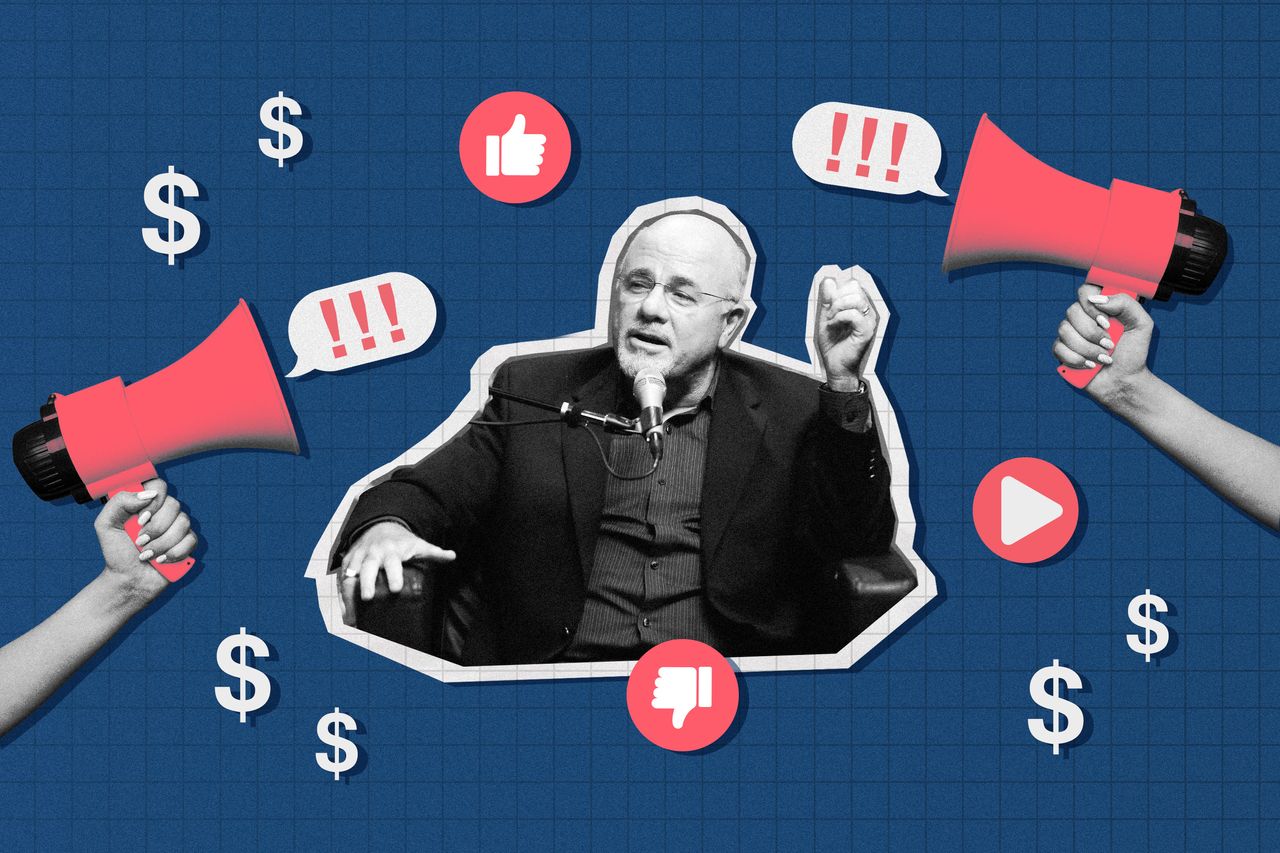Dave Ramsey Tells Millions What to Do With Their Money. People Under 40 Say He’s Wrong.
Young adults are rejecting the finance guru’s advice to live frugally while getting out of debt
On their own for the first time, young professionals are craving sound financial advice. They just don’t want to hear it from Dave Ramsey.
Ramsey, the well-known and intensely followed 63-year-old conservative Christian radio host, has 4.4 million Instagram followers, 1.9 million TikTok followers and legions more who listen to his radio shows and podcasts. His message is brutal and direct: Avoid debt at all costs. Pay for everything in cash. Embrace frugality.
Plenty of 20- and 30-year-olds are pushing back, largely on TikTok. The hashtag #daveramseywouldntapprove, for instance, has 66.8 million views. Many say they don’t want to eat rice and beans every night—a popular Ramsey trope —or hold down multiple jobs to pay off loans. They also say Ramsey is out of touch with their reality.
Rising inflation has led to surging prices for groceries, cars and many essentials. The cost of a college education has skyrocketed in two decades, with the average student debt for federal loans at $37,000, according to the Education Department. Overall debts for Americans in their 30s jumped 27% from late 2019 to early 2023 —steeper than for any other age group. And home prices have risen considerably, while wages haven’t kept pace.
“What Dave Ramsey really misses is any kind of social context,” says Morgan Sanner, a 26-year-old who runs a résumé-advice company in Columbus, Ohio, and has shared her feelings about Ramsey on TikTok.
She began paying off $48,000 in student loans (a Ramsey do ) and also took out a loan to buy a 2016 Honda (a Ramsey don’t ). Her rationale was that it was safer to pay extra for a more reliable car than a junker she could buy with cash. She feels these sorts of real-life decisions don’t factor into his advice. Her video about this has 875,000 views.
Through a spokeswoman, Ramsey declined an interview request. Direct messages to Ramsey went unanswered.
For Ramsey—whose TikTok posts often contain incendiary tidbits from his radio show—the pushback might be part of the plan. After all, uncomfortable advice is a key component of his success.
‘Pretty much screwed already’
Naiomi Israel began watching Dave Ramsey’s videos on YouTube when she was in college at New York University, before TikTok became the go-to platform. (He has more than 500,000 subscribers on YouTube.)
“Not knowing about money feels scary, especially when you’re a young adult and have to pay your bills,” she says. “You wonder, ‘Should I go on a trip or invest in the S&P 500?’ I’m just looking for the right answers.”
Israel, who now at age 23 works for a company that develops finance curricula for schools, says she was initially drawn in by Ramsey’s no-nonsense advice. He recommends setting aside some money for emergencies. She did.
But eventually, some of his messages triggered a different response from her: “Wait, what?”
When she saw a comment from Ramsey online about how people receiving pandemic stimulus payments were “ pretty much screwed already ,” Israel felt it came across as shaming people. The pandemic shutdowns ended a decade-long economic expansion for Black Americans , a disproportionate number of whom lost their jobs and relied on those checks.
“Moralising financial decisions is very damaging to marginalised groups,” says Israel, who is Black.
From bankruptcy to broadcasting
Ramsey’s anti-debt evangelism arose from personal circumstances. He says on his website that he took on too much debt while accumulating real estate as a young man. He also bought a Jaguar, jewellery for his wife and a trip to Hawaii. In 1988, he filed for bankruptcy.
How did rich people stay rich? By not paying interest to banks, he concluded.
He started a radio show in 1992 to answer callers’ money questions. It became the top-rated show in Nashville, Tenn., and eventually became a nationally syndicated call-in program with about 20 million weekly listeners.
The radio program begot Ramsey Solutions, a 1,000-person company that encompasses a podcast, 23 money-management books, a budgeting app and personal-financial coaching. Dozens of Facebook groups are devoted to following his methods. Ramsey’s net worth is estimated at more than $200 million.
No credit scores?
Many young adults scratch their heads over his advice that people should let their credit scores dwindle and die .
People need a good credit score, says Mandy Phillips, a 39-year-old residential mortgage loan originator in Redding, Calif. She uses TikTok and other social media to educate millennials and Gen Z about home buying. Scores are vital when applying for mortgages and rentals.
She also takes issue with Ramsey’s advice to only obtain a home loan if you can take out a 15-year fixed-rate mortgage with a down payment of at least 10%. Few younger buyers can pay the large monthly bills of shorter-term mortgages.
“That may have worked years ago in the ’80s and ’90s, but that’s not something that is achievable for the average American,” Phillips says.
Ramsey acknowledges on his website that his views aren’t always in step with conventional economic thinking. “I have an unusual way of looking at the world,” he notes, nodding to his past debt troubles.
Housing is a particularly hot-button topic. He advises people to only buy a house with their lawfully wedded spouse. Yet many young adults are pooling their finances with partners, friends or roommates to buy their first homes.
The debt snowball
Ramsey is perhaps best known for advocating a “ debt snowball method ”: People with multiple loans pay off the smallest balances first, regardless of interest rate. As you knock out each loan, he says, the money you have to put toward larger debt snowballs. Seeing small wins motivates people to keep going, he says.
Conventional economic theory would be to pay off the highest-interest loans first, says James Choi, a finance professor at the Yale School of Management, who has studied the advice of popular finance gurus.
“What Dave Ramsey would say is, ‘I don’t care if paying down the highest-interest debt first is cheapest, because if you give up midway through, that’s more expensive.’ I think the jury is out on that,” Choi says.
Ramsey’s advice has helped a lot of people reduce their spending.
A University of Copenhagen researcher conducted a study that found that when Ramsey’s radio show entered new markets between 2004 and 2019, households in those cities decreased their monthly expenditures by at least 5.4%.
Embracing debt
Ramsey’s save-not-spend message sounds logical, young adults say. It’s his all-or-nothing approach that doesn’t work for them.
Kate Hindman, a 31-year-old administrative assistant in Pasadena, Calif., who has taken an anti-Ramsey stance on TikTok, ended up with $30,000 in credit-card debt after she and her husband faced income-reducing job changes. They’ve since turned it into a consolidation loan with an 8% interest rate and pay about $1,200 a month.
She wonders if the debt aversion is generational. Perhaps younger people are less willing to make huge sacrifices to be debt-free. Maybe carrying some amount of debt forever is a new normal. Hindman’s video about her credit-card debt journey—and how it doesn’t align with Ramsey’s perspective—has more than 745,000 views.
Hindman said in the TikTok video: “I’m sorry, I’m not willing to do anything to get out of debt. I’m not willing to eat rice and beans every day.”
 Copyright 2020, Dow Jones & Company, Inc. All Rights Reserved Worldwide. LEARN MORE
Copyright 2020, Dow Jones & Company, Inc. All Rights Reserved Worldwide. LEARN MORE
This stylish family home combines a classic palette and finishes with a flexible floorplan
Just 55 minutes from Sydney, make this your creative getaway located in the majestic Hawkesbury region.
The remote northern island wants more visitors: ‘It’s the rumbling before the herd is coming,’ one hotel manager says
As European hot spots become overcrowded , travellers are digging deeper to find those less-populated but still brag-worthy locations. Greenland, moving up the list, is bracing for its new popularity.
Aria Varasteh has been to 69 countries, including almost all of Europe. He now wants to visit more remote places and avoid spots swarmed by tourists—starting with Greenland.
“I want a taste of something different,” said the 34-year-old founder of a consulting firm serving clients in the Washington, D.C., area.
He originally planned to go to Nuuk, the island’s capital, this fall via out-of-the-way connections, given there wasn’t a nonstop flight from the U.S. But this month United Airlines announced a nonstop, four-hour flight from Newark Liberty International Airport in New Jersey to Nuuk. The route, beginning next summer, is a first for a U.S. airline, according to Greenland tourism officials.
It marks a significant milestone in the territory’s push for more international visitors. Airlines ran flights with a combined 55,000 seats to Greenland from April to August of this year, says Jens Lauridsen, chief executive officer of Greenland Airports. That figure will nearly double next year in the same period, he says, to about 105,000 seats.
The possible coming surge of travellers also presents a challenge for a vast island of 56,000 people as nearby destinations from Iceland to Spain grapple with the consequences of over tourism.
Greenlandic officials say they have watched closely and made deliberate efforts to slowly scale up their plans for visitors. An investment north of $700 million will yield three new airports, the first of which will open next month in Nuuk.
“It’s the rumbling before the herd is coming,” says Mads Mitchell, general manager of Hotel Nordbo, a 67-room property in Nuuk. The owner of his property is considering adding 50 more rooms to meet demand in the coming years.
Mitchell has recently met with travel agents from Brooklyn, N.Y., South Korea and China. He says he welcomes new tourists, but fears tourism will grow too quickly.
“Like in Barcelona, you get tired of tourists, because it’s too much and it pushes out the locals, that is my concern,” he says. “So it’s finding this balance of like showing the love for Greenland and showing the amazing possibilities, but not getting too much too fast.”
Greenland’s buildup
Greenland is an autonomous territory of Denmark more than three times the size of Texas. Tourists travel by boat or small aircraft when venturing to different regions—virtually no roads connect towns or settlements.
Greenland decided to invest in airport infrastructure in 2018 as part of an effort to expand tourism and its role in the economy, which is largely dependent on fishing and subsidies from Denmark. In the coming years, airports in Ilulissat and Qaqortoq, areas known for their scenic fjords, will open.
One narrow-body flight, like what United plans, will generate $200,000 in spending, including hotels, tours and other purchases, Lauridsen says. He calls it a “very significant economic impact.”
In 2023, foreign tourism brought a total of over $270 million to Greenland’s economy, according to Visit Greenland, the tourism and marketing arm owned by the government. Expedition cruises visit the territory, as well as adventure tours.
United will fly twice weekly to Nuuk on its 737 MAX 8, which will seat 166 passengers, starting in June .
“We look for new destinations, we look for hot destinations and destinations, most importantly, we can make money in,” Andrew Nocella , United’s chief commercial officer, said in the company’s earnings call earlier in October.
On the runway
Greenland has looked to nearby Iceland to learn from its experiences with tourism, says Air Greenland Group CEO Jacob Nitter Sørensen. Tiny Iceland still has about seven times the population of its western neighbour.
Nuuk’s new airport will become the new trans-Atlantic hub for Air Greenland, the national carrier. It flies to 14 airports and 46 heliports across the territory.
“Of course, there are discussions about avoiding mass tourism. But right now, I think there is a natural limit in terms of the receiving capacity,” Nitter says.
Air Greenland doesn’t fly nonstop from the U.S. because there isn’t currently enough space to accommodate all travellers in hotels, Nitter says. Air Greenland is building a new hotel in Ilulissat to increase capacity when the airport opens.
Nuuk has just over 550 hotel rooms, according to government documents. A tourism analysis published by Visit Greenland predicts there could be a shortage in rooms beginning in 2027. Most U.S. visitors will stay four to 10 nights, according to traveler sentiment data from Visit Greenland.
As travel picks up, visitors should expect more changes. Officials expect to pass new legislation that would further regulate tourism in time for the 2025 season. Rules on zoning would give local communities the power to limit tourism when needed, says Naaja H. Nathanielsen, minister for business, trade, raw materials, justice and gender equality.
Areas in a so-called red zone would ban tour operators. In northern Greenland, traditional hunting takes place at certain times of year and requires silence, which doesn’t work with cruise ships coming in, Nathanielsen says.
Part of the proposal would require tour operators to be locally based to ensure they pay taxes in Greenland and so that tourists receive local knowledge of the culture. Nathanielsen also plans to introduce a proposal to govern cruise tourism to ensure more travelers stay and eat locally, rather than just walk around for a few hours and grab a cup of coffee, she says.
Public sentiment has remained in favour of tourism as visitor arrivals have increased, Nathanielsen says.
—Roshan Fernandez contributed to this article.
This stylish family home combines a classic palette and finishes with a flexible floorplan
Just 55 minutes from Sydney, make this your creative getaway located in the majestic Hawkesbury region.






















